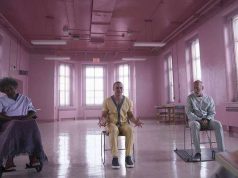There is a palpable thrill in seeing Clint Eastwood stand in his front yard with a rifle and growl, “Get off my lawn!” at some punk kids. It’s a stereotypical thing for a cranky old man to say, and Eastwood — now comfortably settled into the Cranky Old Man phase of his career — embraces it.
The film is “Gran Torino”; Eastwood is both its star and director; I can point to a number of problems with its tone, structure, and style; and yet ultimately I have no beef with it. It pleases me. It has characters I like and dialogue that is funny, usually intentionally. An actor with less pre-existing rapport with the audience might have made this seem dumber and shallower, but Eastwood takes advantage of the fact that we already like him, and that we enjoy seeing him bring comeuppance to hoodlums, no matter how improbably or didactically. It is a Clint Eastwood Movie. If it were not, it would fail.
Eastwood plays Walt Kowalski, a retired Detroit autoworker, a Korean War veteran, and an inveterate racist. Yet that trait alone doesn’t define his character. Like “NYPD Blue’s” Andy Sipowicz — what is it with these Polacks? — Walt is at heart a decent person who was raised with some old-fashioned attitudes. The war screwed him up pretty bad, too. He has horrific memories of combat deaths, and his wife, whom he loved dearly, has just passed away when the film begins. He tells a busybody Catholic priest (Christopher Carley) that he knows plenty about death. The priest asks, “What do you know about life?” Walt doesn’t have an answer for that.
Walt now lives alone with his dog, his guns, his beer, his chewing tobacco, and his 1972 Ford Gran Torino. His house is on a suburban street that was probably very much middle-class when he and his wife moved there but has since been pulled into a lower bracket. Walt blames this on the foreigners, naturally, including the multi-generation family of Hmong immigrants in the house next door. Sometimes Walt talks to himself (or is he talking to us?) about how much he hates the matriarchal old witch who likes to sit on her porch, same as Walt does, and glare at the world. In subtitled Hmong, the old witch (Chee Thao) wonders aloud why Walt doesn’t just move away.
Walt has two grown sons and a few grandchildren, all of them disrespectful and coarse. The film’s first few scenes are devoted to nothing more than establishing these facts: Walt is old, he is cranky, he is annoyed by everything, and his family members disappoint him. His granddaughter (Dreama Walker), who shows up at Grandma’s funeral with a prominent ring in her belly button, is already calling dibs on Walt’s belongings for when he dies, too.
In that house next door live two teenagers, Sue (Ahney Her) and her younger brother Thao (Bee Vang). Sue is outgoing and Americanized; Thao is subdued and desperate to fit in, which makes him easy prey when his delinquent cousins try to initiate him into their gang. Potential violence along those lines is what draws Walt into things, and it’s where we see that his racism isn’t based on any actual beliefs he has about the relative superiority of the races. Asians aren’t lower than whites in Walt’s view — they’re just different. And Walt, like many of his generation, automatically puts up barriers against things that are different.
At his core, Walt is more honorable than he is bigoted. Like almost every character Eastwood has ever played, Walt has a strong sense of justice, believing most choices to be either categorically Right or unmistakably Wrong. Because it is the Right thing to do, he reluctantly becomes a father figure to Sue and Thao (their own father is absent). He likes that Sue responds to his jibes by laughing him off; she’s brassy, she’s smart, and she stands up for herself. Walt respects that. Thao, on the other hand, is a wimp, and Walt sees a chance to shape the kid, to teach him to work, and to make a man out of him the way he failed to do with his own sons.
Gradually, Thao stops looking so downcast and starts behaving manfully. Looking askance at Walt’s tobacco, Thao says, “You should quit. That’s bad for you.”
“Yeah?” Walt snarls. “So’s being in a gang, dips***.”
Far from being a two-dimensional caricature of elderly impatience, Walt emerges as a genuine, recognizable person, probably similar in many ways to your own grandfathers. His exterior is gruff, his ideas shaped by attitudes that are sometimes embarrassingly pre-modern, and he is demanding. But once you understand how he operates, you can relate to him. Witness the scenes between him and his much younger barber (John Carroll Lynch), their vulgar sparring done out of affection, not hostility. The moments of Walt teaching Thao how to be a man — i.e., to swear, and to complain about @&*&!@ auto mechanics trying to *@&*# him over — are also endearing.
Nick Schenk’s screenplay (for which he shares story credit with Dave Johannson) must cop to the charge of being over-simplified, boiling down conflicts with the Hmong gang members into easy-to-digest but hard-to-believe nuggets. It’s peripatetic, too: At first it’s Walt’s interaction with the priest, who makes him confront his demons, that seems to be the focus; then it’s Walt and Sue; finally it’s Walt and Thao, while the priest all but disappears from the film. Some of the early dialogue establishing Walt’s personality is so contrived you’d think it was part of a comedy sketch, particularly since Eastwood has this habit of literally growling his lines, the way a young person doing a parody of an old person might do.
But like I said, none of this matters much in the end. Eastwood, a cautious and efficient director, doesn’t do any grandstanding, but he knows how to play to our expectations of him. In rescuing Sue from some African American teens who are accosting her, he says in that guttural whisper of his, “Ever notice how you come across somebody once in a while that you shouldn’t have f***** with?” (Here he spits tobacco juice.) “That’s me.” Heaven help the punk who doesn’t tremble with terror at being thus addressed by Clint Eastwood, and pity the viewer who doesn’t delight in watching it.
Though Eastwood the director is astonishingly active (“Gran Torino” is his second film of 2008, after “Changeling”), Eastwood the actor shows up infrequently these days. This is only his fourth onscreen appearance of the 2000s; there’s nothing on the horizon; and the man is, after all, 78 years old: This could be his final performance. It has an elegiac quality to it, like a swan song, and while I hope Eastwood is around for a long time to come, he could do worse than this for a farewell number. Walt Kowalski has many of Eastwood’s iconic qualities, and even if the movie isn’t perfect, the character just might be.
B (1 hr., 57 min.; )





